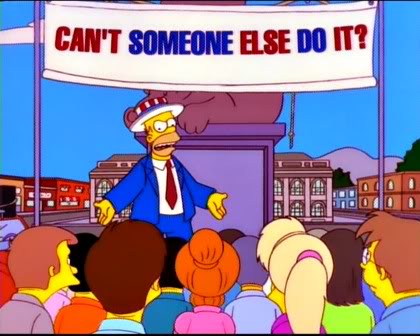I have three questions for you…
Q1: Do you find yourself spending more time on your smartphone than you realize?
Q2: Do you wish you could do something to reduce the hold your phone has over you?
Q3: Are you to blame?
***
We seem to live in a world these days reminiscent of one of my favorite episodes of The Simpsons, Trash of the Titans.
Just like in Springfield where the townsfolk were too lazy to deal with their own rubbish problems and decide to outsource them to a round-the-clock sanitation service instead, we seem to be constantly dodging responsibility.
We look for every possible reason why we can blame someone else for the problem at hand and when it comes time to fixing the problem, we outsource it.
Like Homer, we ask: “Can’t someone else do it?”
I would argue that there is no stronger indicator of this “can’t-someone-else-do-it?” culture than in the way we are responding to our so-called “addiction” to our digital devices.
Instead of accepting responsibility for the way we use technology, and for our reluctance to set up boundaries between our online and offline lives, we blame social media, we blame the tech companies, we blame the app designers. In short, we blame everyone but ourselves.
Yes, our phones are designed to addict us, but in the same way that Netflix is set-up to keep you “binging” by automatically playing the next episode in the queue, we ultimately have control and make the choice whether to stay or go; as Catherine Price argues in her book How to Break Up With Your Phone, “what we think of as irresistible impulses are actually invitations… The moment you recognise that you don’t have to say yes to every invitation is the moment you regain control over your life.”
We are kidding ourselves if we expect app developers, social media founders and smartphone designers to build into their products ways to limit our use (and abuse) of technology.
Just like supermarkets are not going to suddenly stop selling unhealthy food just because it’s bad for you, we can’t and should not simply expect “someone else to do it”.
It is time for us to take a good hard look at ourselves and acknowledge what WE are doing to create or maintain the dysfunctional relationship that we have with our phones.
To stare into the face of the pocket-sized black mirror in front of us, and admit…
It’s not you, it’s me.
Originally published at ideapod.com


